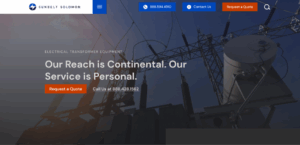President Joe Biden announced $2.8 billion in grants on Wednesday to expand U.S. production of electric vehicle batteries, with some awards going to suppliers of major auto companies including Tesla and Mercedes-Benz.
Twenty companies received grants ranging from $50 million to over $480 million under the first round of funding through the Bipartisan Infrastructure law. The president also announced the American Battery Materials Initiative, a whole-of-government effort to secure a reliable and sustainable supply of critical minerals used in EVs.
The moves are meant to boost U.S. supply of electric vehicle battery components, while reducing reliance on China.
“China’s battery technology is not more innovative than anyone else’s,” Biden said at an event announcing the awards. “But by undercutting U.S. manufacturers with their unfair subsidies and trade practices, China seized a significant portion of the market.”
The funding will support manufacturers that have recently inked partnerships with large automakers such as Tesla, General Motors and Mercedes-Benz.
Sila Nanotechnologies received $100 million to build a factory in Moses Lake, Washington, that will supply Mercedes-Benz with lithium-ion anode materials once operational. Talon Metals subsidary Talon Nickel, which recently inked a supply agreement with Tesla, received $114.8 million to construct a battery minerals processing facility to help meet demand.
“From mine to battery production, Talon and Tesla plan to create a domestic supply chain from primary (mined) nickel ore through to recycling,” according to the project description.
Ascend Elements, which makes EV components through the recycling of lithium-ion batteries, received the most funding with two grants totaling over $480 million. The company plans to build two facilities to expand production of battery materials.
Automakers have rushed to expand electric vehicle production in North America. The Biden administration set a goal for half of new U.S. vehicle sales to be electric by 2030, and the White House has pushed new incentives for automakers to produce and source closer to home. The president also invoked the Defense Production Act in March to support the production and processing of minerals.
“The demand for minerals like lithium and graphite is expected to increase by as much as 4,000%,” Biden said. “Some see it as a challenge, but we see an opportunity — a real opportunity to shift to a net-zero sum carbon world in one of the most significant economic transitions since the Industrial Revolution.”
Projects funded under the Bipartisan Infrastructure Law
| Company | Grant amount | Project purpose |
|---|---|---|
| 6k Inc | $50 million | Demonstrate ability to produce battery chemistries through a process generating 70% less greenhouse gas emissions than traditional methods. |
| Albemarle U.S. | $149.7 million | Construct a commercial-scale lithium materials processing plant at Kings Mountain, North Carolina. |
| American Battery Technology Company | $57.7 million | Build and operate a commercial-scale facility to demonstrate a novel process for manufacturing cathode grade lithium hydroxide. |
| Amprius | $50 million | Install and operate production lines to demonstrate manufacturing of silicon nanowire anode technology. |
| Anovion LLC | $117 million | Add 35,000 tons in annual capacity of synthetic graphite anode materials, used in lithium-ion batteries critical to electric vehicles and critical energy storage. |
| Applied Materials | $100 million | Set up a manufacturing facility to support production of advanced lithiated anodes for battery cell makers and automobile manufacturers. |
| Ascend Elements | $316.2 million | Build the first domestic, commercial-scale facility for integrated metal extraction and production of precursor cathode active materials. The facility will produce enough material to supply over 250,000 electric vehicles annually. |
| Ascend Elements | $164.4 million | Plan, design, and construct a cathode active materials plant in Hopkinsville, Kentucky. |
| Cirba Solutions | $75 million | Expand and upgrade a lithium-ion recycling facility in Lancaster, Ohio. |
| Membrane Holdings LLC – ENTEK | $200 million | Construct a lithium battery separator plant capable of producing components for around 1.4 million electric vehicles a year. |
| Group14 TechnologiesInc. | $100 million | Build two commercial manufacturing modules capable of producing 2,000 tons per year of silicon-carbon composite, which can be used instead of graphite in lithium-ion battery anodes. |
| ICL-IP America Inc | $197.3 million | Expand a facility in St. Louis, Missouri, to produce lithium iron phosphate cathode powder. |
| Koura | $100 million | Build the first lithium hexafluorophosphate manufacturing plant in the U.S. The facility will be located on the grounds of the company’s fluorochemical production site in St. Gabriel, Louisiana. |
| Lilac Solutions | $50 million | Demonstrate ability to produce lithium at commercially relevant scales using the company’s patent extraction technology in Fernley, Nevada. |
| Microvast | $200 million | Build a facility to expand production of separators enabling faster charging and longer battery life. |
| NOVONIX Anode Materials LLC | $150 million | Build a plant in Chattanooga, Tennessee, to produce 30,000 metric tons per year of graphite targeted at the electric vehicle industry. |
| Piedmont Lithium Inc | $141.7 million | Build a lithium hydroxide facility in McMinn County, Tennessee, capable of producing 30,000 metric tons per year. |
| Sila Nanotechnologies | $100 million | Support construction of a factory in Moses Lake, Washington, that will produce lithium-ion anode materials. At full capacity, the plant will be the largest silicon anode production facility in the world. |
| Solvay Specialty Polymers USA, LLC | $178.2 million | Build a facility in Augusta, Georgia, to produce polyvinylidene fluoride, which is used as a cathode binder and separator coating material in battery production. |
| Syrah Technologies LLC | $219.8 million | Expand a facility in Vidalia, Louisiana, to boost production of active anode material. |
| Talon Nickel (USA) | $114.8 million | Construct a battery minerals processing facility in Mercer County, North Dakota. |
Source: U.S. Department of Energy
This story was first published in our Procurement Weekly newsletter. Sign up here.



Responses